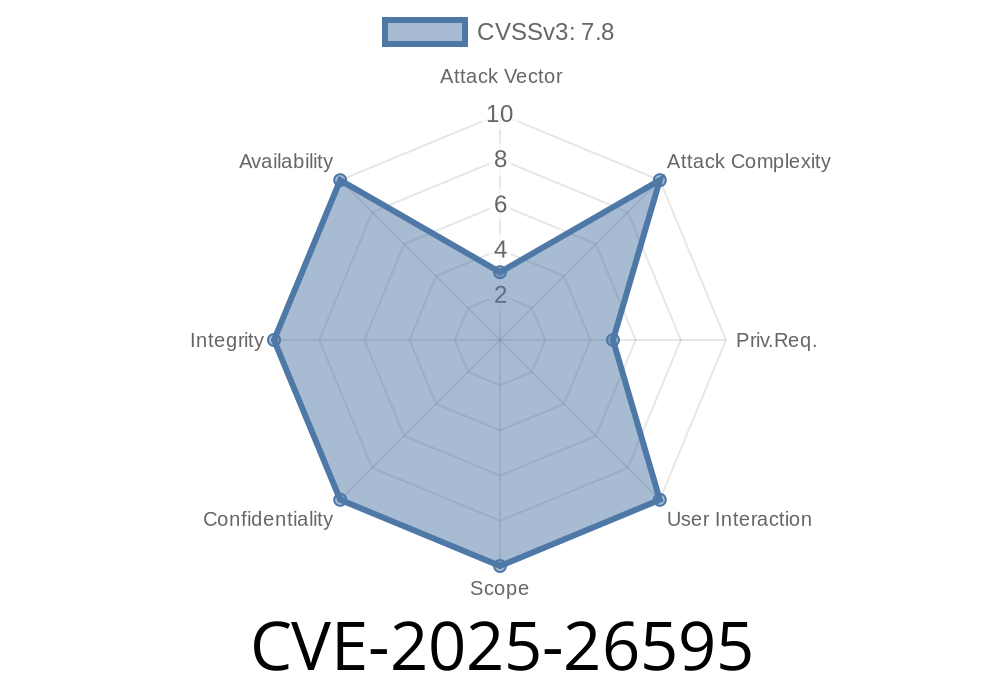In early 2025, a serious security issue was found in X.Org and XWayland—two important components at the heart of many Linux and Unix graphical environments. This vulnerability, logged as CVE-2025-26595, stems from a classic programming mistake: a buffer overflow in the function XkbVModMaskText(). Anyone exploiting this bug could potentially run malicious code with the permissions of the X server, which almost always means getting complete control of your desktop session.
This write-up explains the bug, showcases relevant code, links to additional resources, and demonstrates the real-world risk with an exploit description. All details are written in a clear and simple style.
What: An unchecked buffer overflow vulnerability
- How: The code copies data into a stack-allocated buffer without checking if there’s enough space
At Risk: Most Linux distributions running X.Org and Wayland as their graphical server backend
The Problem
The risky function, XkbVModMaskText(), is responsible for collecting and formatting X keyboard (XKB) virtual modifier info (think keyboard layout stuff) into a readable string. To do this, it declares a fixed-length buffer on the stack (meaning it is NOT dynamically resizable). Then, it proceeds to copy modifier names into this buffer—without checking if everything fits.
The Vulnerable Code
Here’s a simplified code sample to show how the vulnerability occurs. This is adapted from the original code seen in X server repositories:
#define BUF_SIZE 100
int XkbVModMaskText(unsigned int mask, char *buf, XkbDescPtr xkb) {
char temp[BUF_SIZE]; // Fixed-size stack buffer
int n = ;
// Loops through all virtual modifier names
for (int i = ; i < XkbNumVirtualMods; i++) {
if (mask & (1 << i)) {
// Directly copies name to buffer, regardless of total length!
strcpy(temp + n, xkb->names->vmods[i]);
n += strlen(xkb->names->vmods[i]); // advances n without checks
}
}
// ... more code ...
strcpy(buf, temp); // copies temp out
return 1;
}
What's wrong?
If enough “virtual modifier” names exist, their total length might surpass 100 bytes (the buffer size). This excess will overwrite nearby memory—classic stack buffer overflow.
Original References
- X.Org Security Advisory (XSA-2025-01)
- Official X.Org Patch Pull Request
- NVD Entry for CVE-2025-26595
- Ubuntu Security Notice
How an Attacker Could Use This
If an attacker can control or influence the names of virtual modifiers (for example, via a crafted keyboard layout file or through interaction with an X application), they could cause the buffer overflow to:
Overwrite the stack with chosen data, potentially controlling the instruction pointer
- Trigger execution of attacker-controlled code, giving them access to the X server or even root privileges (if the X server runs as root or with special capabilities)
Simple Exploit Scenario
Suppose an attacker supplies modifier names, each being very long (say, 50+ bytes), and enough of them so their total exceeds the 100-byte buffer. For controlled conditions, they insert shellcode (special binary instructions) into the modifier data, causing the server to crash or execute their code.
Pseudo-exploit code to trigger overflow
1. Craft a keyboard map with 10 virtual modifiers, each named "AAAAAAAAAA... (repeats, 50 times)".
2. Load keyboard map into X.Org or XWayland via xkbcomp or xmodmap.
3. Call a function (locally or via a malicious X client) that triggers XkbVModMaskText().
4. Observe buffer overflow, leading to a server crash or code execution.
Upstream patch example
// Before:
strcpy(temp + n, xkb->names->vmods[i]);
// After:
strncat(temp + n, xkb->names->vmods[i], BUF_SIZE - n - 1);
// Or, better:
if (n + strlen(xkb->names->vmods[i]) < BUF_SIZE) {
strcpy(temp + n, xkb->names->vmods[i]);
n += strlen(xkb->names->vmods[i]);
}
Restrict who can connect to your X session.
- Check vendor/security advisories for more details.
Conclusion
CVE-2025-26595 is a high-severity stack buffer overflow flaw in X.Org and XWayland, potentially giving attackers a way to crash or take over graphical environments in Linux and Unix desktops. It is crucial for both users and administrators to apply updates quickly, especially on multi-user systems or publicly accessible infrastructure.
Stay safe: keep your system up to date and monitor official advisories.
More Reading
- What is a Buffer Overflow? (OWASP)
- How to Secure X.Org/XWayland
- X.Org Project Official Security Page
If you found this guide helpful, share it with your sysadmin friends and check your systems for updates now!
Timeline
Published on: 02/25/2025 16:15:38 UTC
Last modified on: 03/21/2025 17:50:22 UTC
